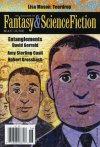Paul Di Filippo reviews Emily St. John Mandel
Some scholar could construct a fine dissertation on the symbolic (and practical) importance of ruined highways in post-apocalypse fiction. (You might be able to work in Ballard’s famous empty, debris-strewn swimming pools too.) Representative of all our modern achievements and freedoms, highways, in a ruinous state, are quick and potent emblems of a fallen condition, futurity gone bad. I always recall the opening of William Tenn’s “Eastward Ho!” in this regard. “The New Jersey Turnpike had been hard on the horses. South of New Brunswick the potholes had been so deep, the scattered boulders so plentiful, that the two men had been forced to move out at a slow trot, to avoid crippling their precious animals.” Wow, you know you’re not in Kansas—at least, familiar Kansas—anymore after that!
After blithely and effectively—but not callously—destroying civilization with a pandemic called the Georgia Flu in an economical thirty pages, Emily St. John Mandel gives us similar imagery, to equally good effect, in her fourth book, Station Eleven. “Twenty years after the end of air travel, the caravans of the Traveling Symphony moved slowly under a white-hot sky…Trees pressed in close at the sides of the road and erupted through cracks in the pavement… The caravans had once been pickup trucks, but now they were pulled by teams of horses on wheels of steel and wood.” Here we are, twenty years after the collapse of everything, and life goes on despite all.
Mandel will circle back to pre-collapse events in a kind of hopscotch narrative. Like instruments in a symphony, all the parts—realtime and flashbacks—will harmonize and contribute to our understanding of the cataclysm and the roles our selected humans play in it.
The book starts in contemporary times, and introduces the three main figures who will bounce in and out of our purview. They are the actor Arthur Leander, whom we are about to see die onstage in mid-dialogue. The eight-year-old actress Kirsten Raymonde, who is also onstage. And from the audience, Jeevan Chaudhary, an EMT in training, who leaps to the rescue at the first sign of Leander’s highly public malaise. All three form a tableau for a moment which is like a frozen instant of time, prefiguring or encapsulating what is to come.
That evening of Leander’s death, the simmering pandemic assumes official existence, and it’s TEOTWAWKI time. We will then jump twenty years into the future and follow Kirsten as she journeys on a regular circuit with the Traveling Symphony, performing Shakespeare for the scattered communities of survivors in the Great Lakes region. We also will see more of Leander’s life; how Jeevan survived the collapse; and how Leander’s ex-wife Miranda came to create an SF graphic novel titled Station Eleven, which fell into Kirsten’s hands and has served as a talisman for her ever since. The intricate dance of synchronicity and circumstance that links everyone and everything here assumes Crowleyesque or Helprinesque proportions. The reader feels for these people and marvels at the odd skeins of Fate that connect us all, on a surface level and on strata we cannot see. And I won’t even get into the derivation of the madman Prophet who comes to plague Kirsten and her troupe. Suffice it to say that the uncanny oddness of his origins will somehow come to seem inevitable.
Mandel’s depiction of the post-collapse world is vivid and naturalistic, while still exhibiting a few surreal touches. But for the most part, she hews to a solid mimetic tradition that allows the reader full sensory and sensual entrance into this future. In this regard, she stands opposed to those recent nigh-psychedelic armageddons such as Margaret Atwood’s MaddAddam trilogy, or Ben Marcus’s The Flame Alphabet. In fact, she hews closely to such canonical works as Edgar Pangborn’s Davy, John Wyndham’s The Chrysalids, and Leigh Brackett’s The Long Tomorrow.
Her future, then, is very convincing. (Mandel utilizes a physical constraint I never bothered to think about before: the limited shelf life of unprotected gasoline.) But I do have one quibble with the level of scarcity she portrays. Consider this: the Georgia Flu is highly communicable, kills in 48 hours, and has a lethality rate of 99.99%. Given these factors, the vast infrastructure of modern life and the vast repositories of goods should have survived intact, and afforded the few remaining humans almost a luxurious level of readymade goods. It’s unlikely that even any city-destroying infernos could have been triggered by the rapidly dying populace. And yet a member of the Traveling Symphony cannot even find a pair of replacement eyeglasses for himself. Also, books seem to have vanished for the most part. Nor has anyone bothered to rig up a DVD player and monitor to a generator and watch old movies, or access old computer hard drives and their media and archival files. I have a thirty-year-old Macintosh computer that still boots up nicely. Seems like Kirsten should too.
But once you accept Mandel’s parameters, everything flows with convincing and frightening rigor. The survivors of Year Twenty are wont to muse on the fabled past. “[We] are always looking for the former world, before all traces of the former world are gone.” And in fact the flashback portions of the novel, while fascinating in their own right, insofar as they detail the soap-opera that was Arthur Leander’s life, also eventually come to represent the heedless way in which we lucky and privileged folks with electricity and running water conduct ourselves.
“There was a moment on Earth, improbable in retrospect and actually briefer than a moment in the span of human history, more like the blink of an eye, when it was possible to make a living solely by photographing and interviewing famous people.”
Like all the best SF, Station Eleven is simultaneously a comment on the present moment, and a speculation on where we go from here.








